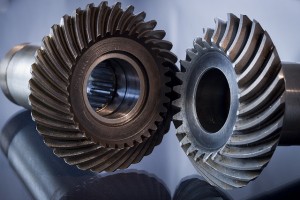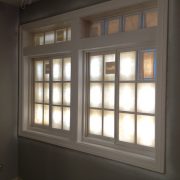Metallic glass gears could be headed to space
Aerospace engineers are looking at metallic glass as a potential material for gearing systems used in space. The material, which is made by melting metal, then cooling it rapidly, may prove to be useful in space vehicles, remote controlled equipment and robots.
Metallic glass is a manmade substance that relies on rapid cooling – on the order of 1,800 degrees Celsius per second – of metal to prevent the material from crystallizing at the atomic level. Ordinarily, solids have a crystalline structure, which is rigid and ordered. Glass, on the other hand, cools in such a way to prevent molecular crystallization. Instead, the material hardens without crystallizing. The molecules that make up glass order themselves randomly. In their liquid states, metallic glasses can be molded and shaped easily, the same way that glass can be blown or shaped.
Using metallic glass is interesting to scientists because the material retains the strength of metal, but can operate at extremely low temperatures and without the need for lubrication. The ability to work without lubrication is key. On Earth, lubrication is necessary to reduce friction and wear, but it will freeze and become ineffective at low temperatures. In space, power – which can be hard to come by – must be diverted from a device to heaters designed to keep the lubricants flowing. Preliminary testing showed that metallic glass could operate effectively at temperatures below minus 300° F without the need for lubricants.
Metallic glass also sidesteps another important problem: brittleness. At extremely low temperatures, metals tend to become brittle, which makes them vulnerable to breakage. Metallic glasses are not brittle at low temperatures, so gear teeth are less likely to be damaged in hostile environments.
Metallic glass also lends itself to mass production and rapid production techniques. Metallic glass can be blow molded or injection molded. Both of these techniques can rapidly produce parts, which can reduce the overall cost of making space vehicles. They can also lower costs for non-aerospace applications that can take advantage of metallic glass.
Glassprimer™ glass paint is a specialized glass coating that bonds permanently to glass surfaces. GlassPrimer also makes a glass surface molecular activator that is designed to work with UV-inkjet glass printing processes. For more information about Glassprimer™ glass paint, please visit the rest of our site. If you’d like to purchase Glassprimer™ glass paint, please visit our online store .
Photo Credit: Alex Saunders, via Flickr.com



